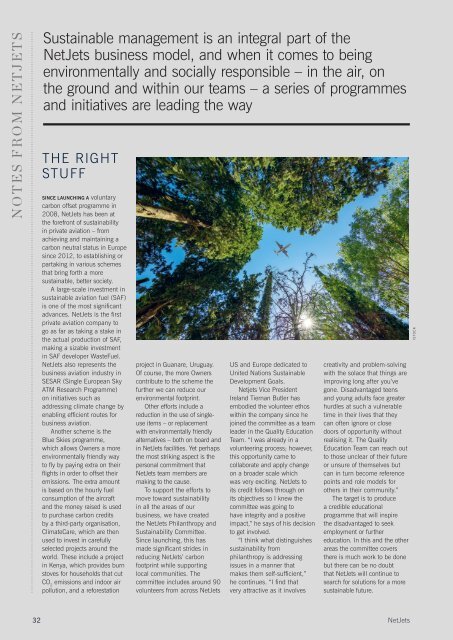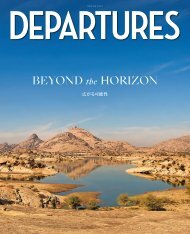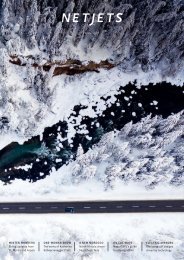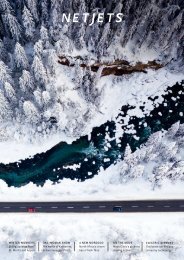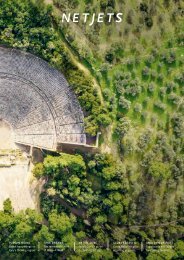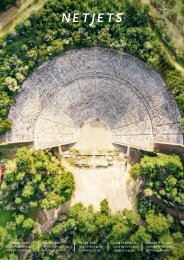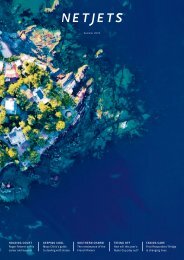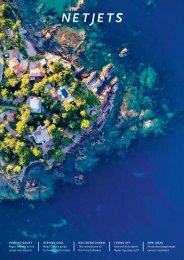NETJETS EU VOLUME 16 2021
- No tags were found...
You also want an ePaper? Increase the reach of your titles
YUMPU automatically turns print PDFs into web optimized ePapers that Google loves.
NOTES FROM <strong>NETJETS</strong><br />
Sustainable management is an integral part of the<br />
NetJets business model, and when it comes to being<br />
environmentally and socially responsible – in the air, on<br />
the ground and within our teams – a series of programmes<br />
and initiatives are leading the way<br />
THE RIGHT<br />
STUFF<br />
SINCE LAUNCHING A voluntary<br />
carbon offset programme in<br />
2008, NetJets has been at<br />
the forefront of sustainability<br />
in private aviation – from<br />
achieving and maintaining a<br />
carbon neutral status in Europe<br />
since 2012, to establishing or<br />
partaking in various schemes<br />
that bring forth a more<br />
sustainable, better society.<br />
A large-scale investment in<br />
sustainable aviation fuel (SAF)<br />
is one of the most significant<br />
advances. NetJets is the first<br />
private aviation company to<br />
go as far as taking a stake in<br />
the actual production of SAF,<br />
making a sizable investment<br />
in SAF developer WasteFuel.<br />
NetJets also represents the<br />
business aviation industry in<br />
SESAR (Single European Sky<br />
ATM Research Programme)<br />
on initiatives such as<br />
addressing climate change by<br />
enabling efficient routes for<br />
business aviation.<br />
Another scheme is the<br />
Blue Skies programme,<br />
which allows Owners a more<br />
environmentally friendly way<br />
to fly by paying extra on their<br />
flights in order to offset their<br />
emissions. The extra amount<br />
is based on the hourly fuel<br />
consumption of the aircraft<br />
and the money raised is used<br />
to purchase carbon credits<br />
by a third-party organisation,<br />
ClimateCare, which are then<br />
used to invest in carefully<br />
selected projects around the<br />
world. These include a project<br />
in Kenya, which provides burn<br />
stoves for households that cut<br />
CO 2<br />
emissions and indoor air<br />
pollution, and a reforestation<br />
project in Guanare, Uruguay.<br />
Of course, the more Owners<br />
contribute to the scheme the<br />
further we can reduce our<br />
environmental footprint.<br />
Other efforts include a<br />
reduction in the use of singleuse<br />
items – or replacement<br />
with environmentally friendly<br />
alternatives – both on board and<br />
in NetJets facilities. Yet perhaps<br />
the most striking aspect is the<br />
personal commitment that<br />
NetJets team members are<br />
making to the cause.<br />
To support the efforts to<br />
move toward sustainability<br />
in all the areas of our<br />
business, we have created<br />
the NetJets Philanthropy and<br />
Sustainability Committee.<br />
Since launching, this has<br />
made significant strides in<br />
reducing NetJets’ carbon<br />
footprint while supporting<br />
local communities. The<br />
committee includes around 90<br />
volunteers from across NetJets<br />
US and Europe dedicated to<br />
United Nations Sustainable<br />
Development Goals.<br />
Netjets Vice President<br />
Ireland Tiernan Butler has<br />
embodied the volunteer ethos<br />
within the company since he<br />
joined the committee as a team<br />
leader in the Quality Education<br />
Team. “I was already in a<br />
volunteering process; however,<br />
this opportunity came to<br />
collaborate and apply change<br />
on a broader scale which<br />
was very exciting. NetJets to<br />
its credit follows through on<br />
its objectives so I knew the<br />
committee was going to<br />
have integrity and a positive<br />
impact,” he says of his decision<br />
to get involved.<br />
“I think what distinguishes<br />
sustainability from<br />
philanthropy is addressing<br />
issues in a manner that<br />
makes them self-sufficient,”<br />
he continues. “I find that<br />
very attractive as it involves<br />
creativity and problem-solving<br />
with the solace that things are<br />
improving long after you’ve<br />
gone. Disadvantaged teens<br />
and young adults face greater<br />
hurdles at such a vulnerable<br />
time in their lives that they<br />
can often ignore or close<br />
doors of opportunity without<br />
realising it. The Quality<br />
Education Team can reach out<br />
to those unclear of their future<br />
or unsure of themselves but<br />
can in turn become reference<br />
points and role models for<br />
others in their community.”<br />
The target is to produce<br />
a credible educational<br />
programme that will inspire<br />
the disadvantaged to seek<br />
employment or further<br />
education. In this and the other<br />
areas the committee covers<br />
there is much work to be done<br />
but there can be no doubt<br />
that NetJets will continue to<br />
search for solutions for a more<br />
sustainable future.<br />
ISTOCK<br />
32 NetJets


